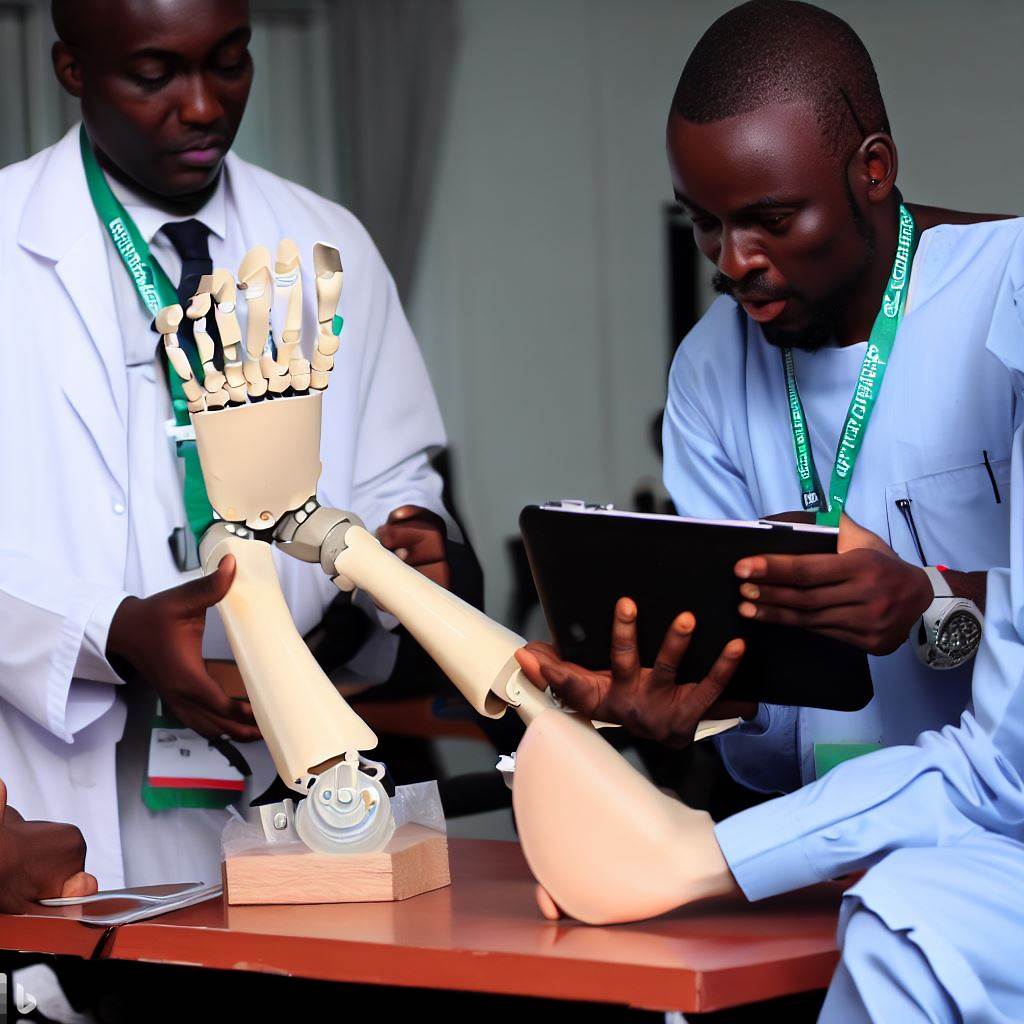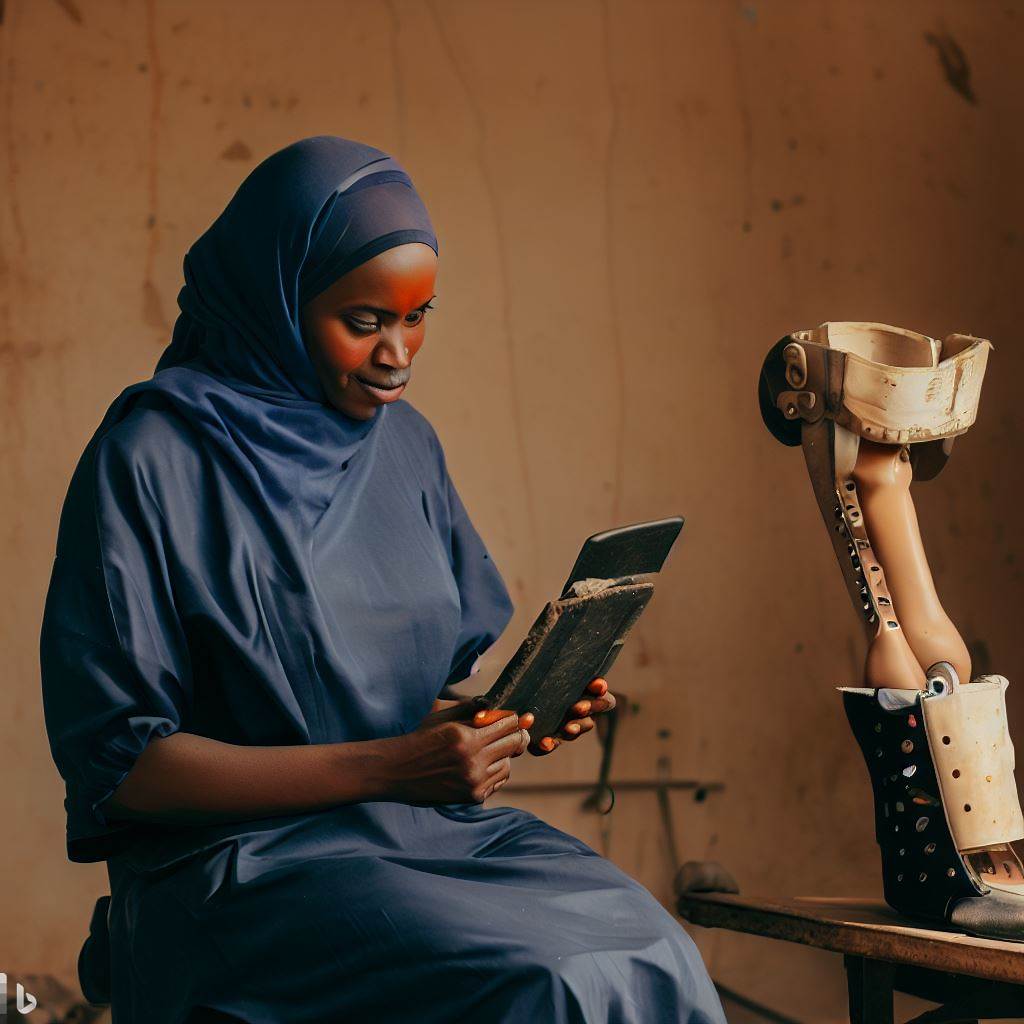Introduction
Orthotists and prosthetists are essential healthcare professionals who specialize in providing customized orthotic and prosthetic devices to patients, aiming to enhance mobility, function, and overall quality of life for individuals with physical disabilities.
Role and Importance of Orthotists and Prosthetists in Healthcare
In Nigeria, the focus of this blog post revolves around the training of orthotists and prosthetists.
As the demand for these specialized services continues to grow, the importance of well-trained professionals cannot be overstated.
The training encompasses a comprehensive curriculum that equips aspiring orthotists and prosthetists with the knowledge and skills necessary to assess patients’ needs, design and create appropriate devices, and provide proper care and support throughout the treatment process.
The training program in Nigeria emphasizes hands-on experience, technological advancements in orthotics and prosthetics, and a deep understanding of patient care.
Additionally, collaboration with other healthcare professionals is encouraged to ensure a holistic approach to patient well-being.
In review, orthotist and prosthetist training in Nigeria plays a pivotal role in fostering skilled professionals who can make a significant difference in the lives of people with physical disabilities.
Their dedication and expertise contribute to enabling greater independence and a better quality of life for their patients.
Overview of Orthotist and Prosthetist Training in Nigeria
Orthotists and prosthetists are healthcare professionals who specialize in designing, fabricating, and fitting orthotic and prosthetic devices for patients with physical disabilities.
In Nigeria, the training for these professionals follows a specific pathway, aimed at equipping them with the necessary skills and knowledge to provide quality care.
Current state of orthotist and prosthetist training programs in Nigeria
The current state of orthotist and prosthetist training programs in Nigeria is a topic of concern.
While there is a growing recognition of the importance of orthotic and prosthetic care, there is still a need for more specialized training opportunities.
Specialized training is vital for orthotists and prosthetists to effectively meet the needs of their patients.
These healthcare professionals play a crucial role in improving the mobility, function, and quality of life for individuals with physical disabilities.
Therefore, their training should be comprehensive and up-to-date.
One of the key components of orthotist and prosthetist training in Nigeria is an overview of the field.
This includes an introduction to orthotics and prosthetics, the types of devices used, and their applications in different healthcare settings.
It provides students with a foundational understanding of the field.
Another vital aspect of training programs is practical experience. Students have the opportunity to gain hands-on experience in designing, fabricating, and fitting orthotic and prosthetic devices.
This practical training is essential for honing their skills and ensuring they can provide effective care to patients.
In addition to technical skills, orthotist and prosthetist training in Nigeria also emphasizes the importance of patient care.
Students learn about the psychosocial aspects of disability and how to communicate and empathize with patients.
This is essential for building rapport and establishing a strong patient-provider relationship.
Continuing education is another crucial component of orthotist and prosthetist training in Nigeria.
As the field evolves and new technologies and techniques emerge, it is essential for healthcare professionals to stay updated.
Continuing education programs ensure that orthotists and prosthetists are equipped with the latest knowledge and skills.
Importance of specialized training for these healthcare professionals
The importance of specialized training for orthotists and prosthetists cannot be overstated. These healthcare professionals play a vital role in improving the quality of life for individuals with physical disabilities.
By receiving specialized training, they can ensure they are providing the highest level of care to their patients.
In conclusion, orthotist and prosthetist training programs in Nigeria are essential for equipping healthcare professionals with the necessary skills and knowledge to provide quality care.
The field is evolving, and specialized training is crucial in meeting the unique needs of individuals with physical disabilities.
By investing in comprehensive training programs, Nigeria can improve the delivery of orthotic and prosthetic care and enhance the lives of those with disabilities.
Educational Requirements and Pathways
Educational Requirements
- A high school diploma or its equivalent is required to pursue a career as an orthotist or prosthetist.
- Strong background in science subjects such as biology, chemistry, and physics is essential.
- Good communication and problem-solving skills are necessary to succeed in this field.
- Passion for helping individuals with physical disabilities and a compassionate nature are beneficial traits.
Academic Qualifications
- Bachelor’s degree in orthotics and prosthetics is a common academic qualification for aspiring professionals.
- Specialized degrees like Bachelor of Science in Orthotics and Prosthetics are also available in Nigeria.
- Completing a master’s degree or higher education can provide advanced knowledge and career opportunities.
Educational Pathways
Degree Programs
Nigerian universities offer bachelor’s degree programs in orthotics and prosthetics.
These programs typically take four to five years to complete and cover both theoretical and practical aspects.
Students acquire knowledge in anatomy, physiology, biomechanics, and orthotic/prosthetic fabrication techniques.
Vocational Training
Individuals can undergo vocational training programs organized by orthopedic hospitals or clinics.
These programs focus on practical skills development and provide hands-on experience in orthotics and prosthetics.
Usually, vocational training programs have shorter durations compared to degree programs.
Internship and Clinical Placements
These internships provide real-life experience and allow students to work alongside experienced professionals.
Internships vary in duration but generally last for a few months to a year.
Overall, individuals interested in becoming orthotists or prosthetists in Nigeria need to meet certain educational requirements and follow specific educational pathways.
A strong academic background in science subjects and a high school diploma are essential.
Pursuing a bachelor’s degree in orthotics and prosthetics or undertaking vocational training are common pathways.
Advanced degrees and internships provide additional knowledge and practical experience necessary for a successful career in this field.
By acquiring the necessary qualifications and skills, individuals can contribute to the well-being and improved mobility of people with physical disabilities in Nigeria.
Read: Key Skills Every Nigerian Nursing Assistant Must Have

Accreditation and Certification
Accreditation and certification play a vital role in ensuring the quality of training programs for orthotists and prosthetists in Nigeria.
Importance of accreditation in ensuring quality training programs
Having accredited programs guarantees that students receive education that meets specific standards established by accrediting bodies.
It ensures that the curriculum, faculty, and facilities meet the necessary requirements for quality training.
Read: Challenges and Solutions in Nigeria’s Social Work Practice
Existing accreditation bodies and standards specific to orthotist and prosthetist training in Nigeria
One of the existing accreditation bodies for orthotist and prosthetist training in Nigeria is the National Board for Technical Education (NBTE).
The NBTE is responsible for evaluating and accrediting technical education programs across the country.
The NBTE sets specific standards for orthotist and prosthetist training programs to ensure that they meet the required quality benchmarks.
These standards cover areas such as curriculum, faculty qualifications, facilities, and student outcomes.
Accreditation by the NBTE is essential for orthotist and prosthetist training programs in Nigeria as it ensures that graduates receive education that is recognized and respected within the country.
In addition to accreditation, there are also certification exams and requirements that individuals must meet to become licensed orthotists and prosthetists in Nigeria.
Certification exams/requirements for becoming a licensed orthotist or prosthetist in the country
The Orthotics and Prosthetics Association of Nigeria (OPAN) is responsible for certifying and regulating professionals in this field.
To become a licensed orthotist or prosthetist in Nigeria, individuals must pass the certification exam administered by OPAN.
The certification exam evaluates the candidate’s knowledge, skills, and competencies in orthotics and prosthetics.
It ensures that licensed professionals meet the required standards to provide quality care to patients.
Other requirements for becoming a licensed orthotist or prosthetist in Nigeria may include completing an accredited training program, gaining practical experience through internships or clinical placements, and obtaining recommendations from professionals in the field.
Obtaining accreditation and certification is crucial for training programs and professionals in the orthotics and prosthetics field in Nigeria.
It ensures that the education provided meets quality standards and that licensed professionals have the necessary skills to provide effective care to patients.
By adhering to accreditation standards and obtaining certification, the orthotist and prosthetist training programs in Nigeria can continuously improve and ensure that they produce competent professionals who can meet the healthcare needs of the country.
Read: Lab Technician Profession: Nigerian Health Sector Impact
Challenges and Opportunities in Orthotist and Prosthetist Training
Current challenges faced in orthotist and prosthetist training in Nigeria
Orthotist and Prosthetist Training in Nigeria encounters various challenges that hinder the development of quality prosthetic and orthotic services.
Limited resources, including infrastructure and materials, pose a significant obstacle to comprehensive training and hands-on experience for students.
Additionally, there is a lack of awareness about the profession among the general population and healthcare professionals, resulting in low demand and recognition for orthotic and prosthetic services.
Furthermore, the shortage of qualified trainers and facilities further restricts access to training programs. To improve the situation, collaboration with international organizations can be a game-changer.
Partnering with experienced professionals and institutions abroad can facilitate knowledge exchange, capacity building, and advanced training techniques.
Government support plays a pivotal role in addressing these challenges.
Allocating funds for the development of training programs, infrastructure, and teaching staff can ensure that students receive better education and practical experience.
The government can also promote awareness through public campaigns and educational initiatives, working alongside healthcare institutions to emphasize the importance of prosthetic and orthotic services.
Therefore, enhancing Orthotist and Prosthetist Training in Nigeria requires overcoming challenges such as limited resources, lack of awareness, and insufficient trainers and facilities.
International collaborations and increased government support hold the key to elevating the quality of training and, ultimately, providing improved prosthetic and orthotic services to those in need.
Read: How to Become a Medical Lab Technician in Nigeria
Explore Further: Mental Health in Nigeria: How Psychiatrists are Changing the Game
See Related Content: Career Spotlight: A Day in the Life of a Nigerian Dietitian
Success Stories and Advancements in the Field
Orthotist and prosthetist training in Nigeria has witnessed remarkable success stories and advancements, revolutionizing the field and improving patient outcomes.
Here are some notable achievements:
The establishment of the National Orthopaedic Hospital in Lagos has significantly contributed to the success of training programs.
One success story is Dr. Afolabi Adeoye, a renowned orthotist and prosthetist trained in Nigeria who is now making waves globally.
Many Nigerian orthotists and prosthetists have showcased their expertise at international conferences and garnered recognition.
With increased awareness and training, several specialized orthotic and prosthetic centers have emerged across the country.
Collaborations with international organizations have provided opportunities for Nigerian orthotists and prosthetists to gain further training and expertise.
Advancements in Technology
The field of orthotist and prosthetist training in Nigeria has witnessed remarkable advancements in technology, enhancing both training methodologies and patient outcomes:
- Computer-Aided Design and Manufacturing (CAD/CAM) technologies have revolutionized the creation of customized orthotics and prosthetics.
- Advanced 3D scanning and modeling techniques provide precise measurements, ensuring optimal fit and comfort for patients.
- The introduction of robotic prosthetics has enabled amputees to regain mobility and live more fulfilling lives.
- Integration of sensor technologies in prosthetic limbs allows for a more natural and intuitive movement.
- Virtual reality (VR) and augmented reality (AR) simulations are used in training programs, providing realistic hands-on experiences.
In short, Nigeria’s orthotist and prosthetist training field has achieved remarkable success stories and witnessed significant advancements in technology.
These accomplishments not only showcase the expertise and dedication of Nigerian professionals but also provide hope and improved outcomes for patients in need of orthotic and prosthetic solutions.
Publish Your Professional Profile, Business or Brand
Showcase your expertise, gain trust, and boost visibility instantly on Professions.ng.
Publish NowRead: The Day-to-Day Life of a Nursing Assistant in Nigeria
Conclusion
Orthotist and prosthetist training plays a vital role in Nigeria’s healthcare system.
By providing individuals with disabilities the means to enhance their mobility and independence, these training programs greatly improve their quality of life.
However, the current lack of investment and support in this field hinders its progress and limits the number of qualified professionals.
Therefore, it is crucial for the government and other stakeholders to prioritize and invest in orthotist and prosthetist training initiatives.
By doing so, Nigeria can develop a skilled workforce that can meet the growing demand for orthotic and prosthetic devices.
Furthermore, increased training opportunities will empower individuals with disabilities, allowing them to reach their full potential and be active contributors to society.
We encourage readers to take the initiative to learn more about orthotist and prosthetist training or support organizations and initiatives that promote its development in Nigeria.
Together, we can ensure that individuals with disabilities have access to the necessary care and support they deserve.




